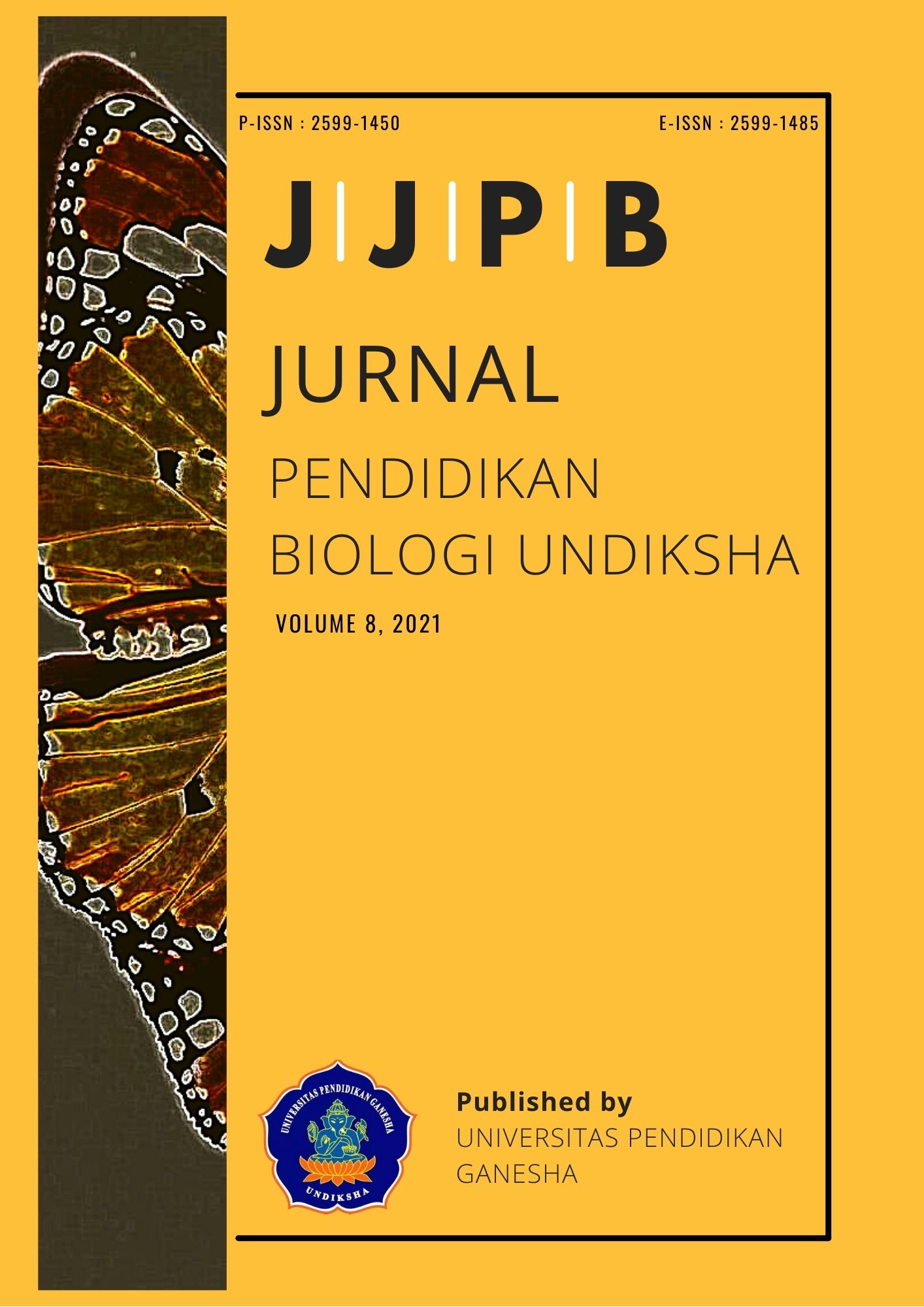Ethical Principles in Biological Research
Keywords:
Biology, Ethics, ScienceAbstract
Science has developed from time to time. The development of science is in the hands of a scientist. A scientist must always think, research, and develop science according to his field. In addition, so that the knowledge he develops is beneficial to humanity. The principles of scientific ethics in the biological sciences are autonomous, not harmful, beneficial, and fair to living things. The application of scientific ethical principles in the development of science can be exemplified in research using experimental animals, where scientists must consider and apply a code of ethics for the use of experimental animals, namely reduction, replacement, and refinement. Scientific ethics also plays a role in reviewing the development of the science of human cloning and chimeras so that whatever is done is for the good and welfare of humans and does not cause controversy. The author makes this article aims to determine the relationship between ethics and philosophy of science, to know the principles of bioethics, and to know what are the ethical principles in the application of science, especially biological science.
References
Afandi, D. (2017). Kaidah dasar bioetika dalam pengambilan keputusan klinis yang etis. Majalah Kedokteran Andalas, 40(2), 111. https://doi.org/10.22338/mka.v40.i2.p111-121.2017
Clarke, A. J., & Wallgren-Pettersson, C. (2019). Ethics in genetic counselling. Journal of Community Genetics, 10(1), 3–33. https://doi.org/10.1007/s12687-018-0371-7
D’Amato, M. E., Bodner, M., Butler, J. M., Gusmão, L., Linacre, A., Parson, W., Schneider, P. M., Vallone, P., & Carracedo, A. (2020). Ethical publication of research on genetics and genomics of biological material: Guidelines and recommendations. Forensic Science International: Reports, 2, 100091. https://doi.org/10.1016/j.fsir.2020.100091
De Vries, J., Bull, S. J., Doumbo, O., Ibrahim, M., Mercereau-Puijalon, O., Kwiatkowski, D., & Parker, M. (2011). Ethical issues in human genomics research in developing countries. BMC Medical Ethics, 12(1), 5. https://doi.org/10.1186/1472-6939-12-5
Frischhut, M., & Werner-Felmayer, G. (2020). A European perspective on medical ethics. Medicine, 48(10), 634–636. https://doi.org/10.1016/j.mpmed.2020.07.001
Gani, A. R. F., Zaimah, U., & Wulandari, S. R. (2020). Studi Literatur Upaya Meningkatkan Literasi Informasi Siswa Pada Mata Pelajaran Biologi Selama Belajar Daring Efek Covid-19. Bioilmi, 6(2).
Hasim, N. A., Amin, L., Mahadi, Z., Yusof, N. A. M., Ngah, A. C., Yaacob, M., Olesen, A. P., & Aziz, A. A. (2020). The Integration and Harmonisation of Secular and Islamic Ethical Principles in Formulating Acceptable Ethical Guidelines for Modern Biotechnology in Malaysia. Science and Engineering Ethics, 26(3), 1797–1825. https://doi.org/10.1007/s11948-020-00214-4
Hürlimann, C. (2019). Research Philosophy and Ethics. In C. Hürlimann, Valuation of Renewable Energy Investments (pp. 111–126). Springer Fachmedien Wiesbaden. https://doi.org/10.1007/978-3-658-27469-6_3
Maftukhin, M. (2015). Ilmuwan, Etika Dan Strategi Pengembangan Ilmu Pengetahuan Di Indonesia. Epistemé: Jurnal Pengembangan Ilmu Keislaman, 10(1), 199–226. https://doi.org/10.21274/epis.2015.10.1.199-226
Maxim, S. T. (2014). Ethics: Philosophy or Science? Procedia - Social and Behavioral Sciences, 149, 553–557. https://doi.org/10.1016/j.sbspro.2014.08.209
Miles, S. H., & Laar, A. K. (2018). Bioethics North and South: Creating a common ground. Ethics, Medicine and Public Health, 4, 59–64. https://doi.org/10.1016/j.jemep.2017.12.004
Morris, N. (2015). Providing ethical guidance for collaborative research in developing countries. Research Ethics, 11(4), 211–235. https://doi.org/10.1177/1747016115586759
Myers, M. D., & Venable, J. R. (2014). A set of ethical principles for design science research in information systems. Information & Management, 51(6), 801–809. https://doi.org/10.1016/j.im.2014.01.002
Nunes, R. (2017). Ethics in science. Porto Biomedical Journal, 2(4), 97–98. https://doi.org/10.1016/j.pbj.2017.04.001
Pollo, S., & Vitale, A. (2019). Invertebrates and Humans: Science, Ethics, and Policy. In C. Carere & J. Mather (Eds.), The Welfare of Invertebrate Animals (Vol. 18, pp. 7–22). Springer International Publishing. https://doi.org/10.1007/978-3-030-13947-6_2
Ren, S., Deng, J., Hong, M., Ren, Y., Fu, H., Liu, Y., & Chen, Z. (2019). Ethical considerations of cellular immunotherapy for cancer. Journal of Zhejiang University-Science B, 20(1), 23–31. https://doi.org/10.1631/jzus.B1800421
Rollin, B. E. (2019). The Ethics of Animal Use in Cancer Research. In E. H. Bernicker (Ed.), Cancer and Society (pp. 143–152). Springer International Publishing. https://doi.org/10.1007/978-3-030-05855-5_11
Swierstra, T. (2015). Introduction to the Ethics of New and Emerging Science and Technology. In R. Nakatsu, M. Rauterberg, & P. Ciancarini (Eds.), Handbook of Digital Games and Entertainment Technologies (pp. 1–25). Springer Singapore. https://doi.org/10.1007/978-981-4560-52-8_33-1
Sya’roni, M. (2016). Etika Keilmuan: Sebuah Kajian Filsafat Ilmu. Jurnal Theologia, 25(1), 245–270. https://doi.org/10.21580/teo.2014.25.1.346
Vaesen, K., & Katzav, J. (2019). The National Science Foundation and philosophy of science’s withdrawal from social concerns. Studies in History and Philosophy of Science Part A, 78, 73–82. https://doi.org/10.1016/j.shpsa.2019.01.001
Varo Baena, A. (2020). Vaccine bioethics and public health. Vacunas (English Edition), 21(1), 57–63. https://doi.org/10.1016/j.vacune.2019.07.001
Vilma, Ž. (2018). Implementing Ethical Principles In Social Research: Challenges, Possibilities And Limitations. St. Ignatius of Loyola College, Kaunas, Lithuania, 29(1).
Wu, J., Platero Luengo, A., Sakurai, M., Sugawara, A., Gil, M. A., Yamauchi, T., Suzuki, K., Bogliotti, Y. S., Cuello, C., Morales Valencia, M., Okumura, D., Luo, J., Vilariño, M., Parrilla, I., Soto, D. A., Martinez, C. A., Hishida, T., Sánchez-Bautista, S., Martinez-Martinez, M. L.,Izpisua Belmonte, J. C. (2017). Inter species Chimerism with Mammalian Pluripotent Stem Cells. Cell, 168(3), 473-486.e15. https://doi.org/10.1016/j.cell.2016.12.036







